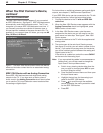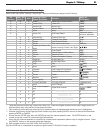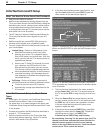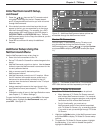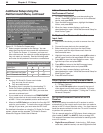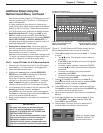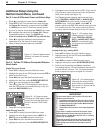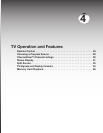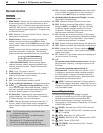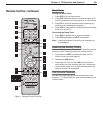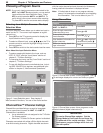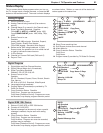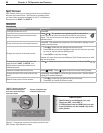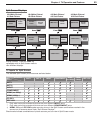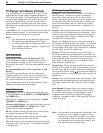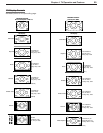
48 Chapter 4. TV Operation and Features
Remote Control
Overview
Figure 1, next page
1. Slide Switch: Selects the A/V device to be controlled
by the remote control. Set the slide switch to
TV
for
operation of the TV, NetCommand-controlled devices,
and IEEE 1394 devices. Control of additional devices
requires programing (see Appendix D, “Programming
the Remote Control.”.
2.
SLEEP
: Sets the TV to turn off within 2 hours. See the
next page for instructions.
3. Digits/Letters: Allow you to tune to a channel by
entering channel numbers; press
ENTER
for faster
tuning. Use numbers and the
CANCEL
key to enter digital
sub-channels. Also use for entering information into
menus.
To select letters when naming channels, repeatedly
press the associated number key. The following
special characters are available with the
1
and
0
keys:
1
! & blank space
0
/ * -
4.
—/CANCEL (SUB-CHANNEL/CANCEL)
: When entering digital
channel numbers, adds a separator between main
and sub-channel numbers. Clears FAV and some
menu entries.
5.
POWER
: Turns TV power on and off.
6.
QV
(QuickView™): Switches between the current
channel and the last channel viewed.
7.
MUTE
: Turns TV sound off or on.
8.
SPLIT
: Turns Split Screen mode on and off.
9.
VOL
/ (Volume Up/Down): Changes sound level.
10.
CH/PAGE
/ (Channel or Page Up/Down): Scans
up or down through memorized channels. Pages up
and down through screens when used with the TV
Guide On Screen system or ChannelView™.
11
FAV
(Favorites): Scans through memorized lists of
favorite channels. See “Channel Menu” in chapter 5,
“TV Menu Settings,” for more information.
12.
FORMAT
: Changes the shape and size of the main TV
picture. When in Split Screen mode, changes the
size of the split images while maintaining their aspect
ratios.
13.
INPUT
: Displays the Input Selection menu from which
you can select an input source to view, such as an
antenna input (
ANT 1
/
2
) or a connected device.
14. (Adjust Up/down/Left/Right): Navigate
menus and change settings.
15.
ENTER
: Selects a channel number or menu item.
16.
GUIDE
:
Displays or removes ChannelView™ channel
listing for
ANT 1
and
ANT 2
. With the TV Guide
On Screen system enabled, launches TV Guide
On Screen. Displays DVD disc or top menu for a
NetCommand-controlled DVD player.
17.
INFO
: Displays an on-screen summary of the current
device in use and any broadcast information available,
including current V-Chip information. See chapter 4,
“TV Operation and Features,” for details.
18.
AUDIO
: Selects individual audio settings for adjustment.
19.
VIDEO
: Selects individual video settings for adjustment.
20.
MENU
: Displays the main TV menu using the
on-screen menu system. When a sub-menu is open,
backs up one level.
21.
EXIT:
Closes all TV on-screen menus and displays and
returns to normal TV viewing.
22.
F1–F4
For devices under NetCommand control: Perform
NetCommand “Learning” to assign functions to the
F1
–
F4
keys.
For devices operating independently of
NetCommand: The
F1
–
F4
keys work like the A, B, C,
D buttons on some cable boxes, satellite receivers,
and DVD players. Program the remote control for
your equipment and test the keys. See Appendix D,
“Programming the Remote Control.”
24.
(
PAUSE
): Freezes a broadcast TV picture when no
Split Screen image is displayed. When Split Screen is
displayed, freezes the sub-picture. See below for use
with recordable media.
Record/Playback Keys
To enable the recording and playback functions:
• program the remote for your VCR or DVD player/
recorder and set the slide switch to
VCR
or
DVD
.
• Perform NetCommand “Learning” for the device.
• See chapter 6, “NetCommand Operations,” for control
of IEEE 1394 devices.
23.
(
RECORD
): Records with a VCR or DVD recorder.
24.
(
PAUSE
): Pauses a VCR or DVD. See above for use
during TV viewing.
25.
(
STOP
): Stops play of a VCR or DVD.
26.
(
REVERSE
): Rewinds a VCR. Reverse scans a DVD.
27.
(
PLAY
): Plays a VCR or DVD.
28.
(
FAST FORWARD
): Fast forwards a VCR. Forward
scans a DVD.
Note: The TV’s remote control can operate other
audio/video devices.
• See chapter 3, “TV Setup,” for NetCommand
“Learning” of device keys.
• See Appendix D, “Programming the Remote
Control” for instructions on programming.
• For control of IEEE 1394 devices, see chapter 6.



